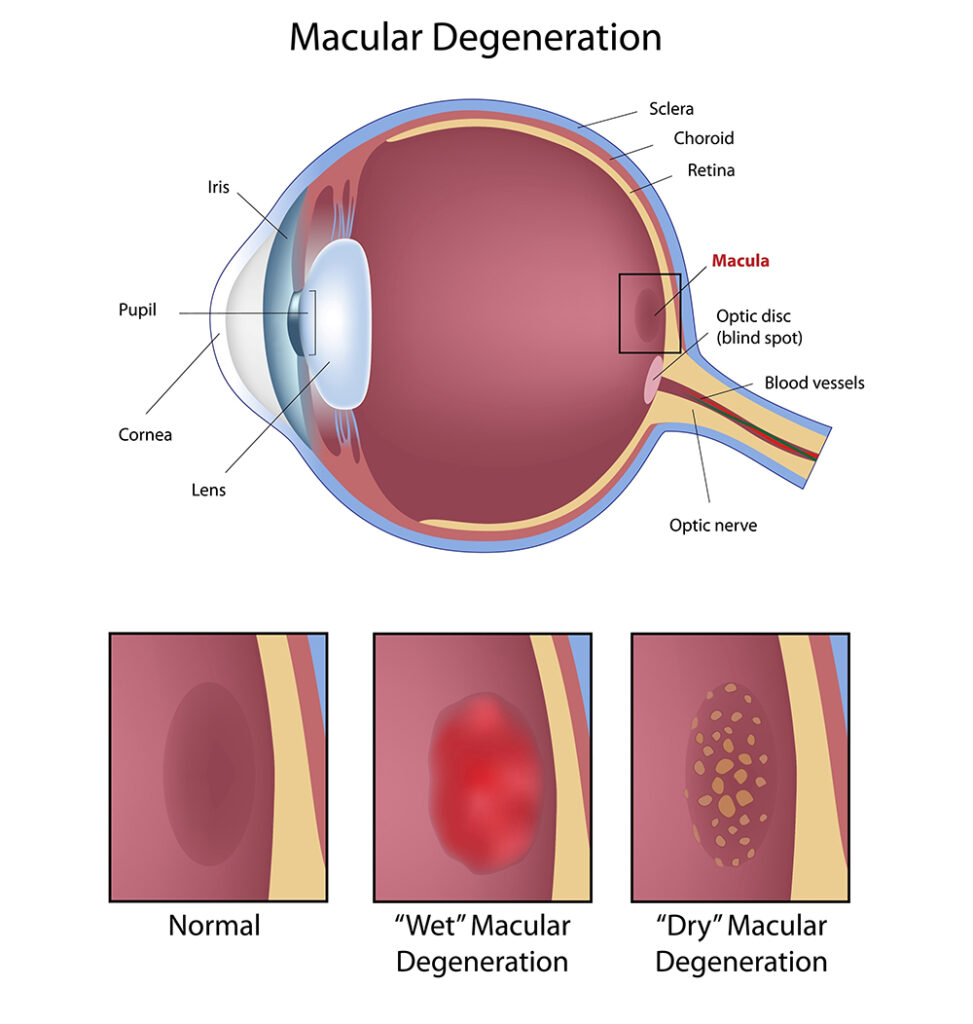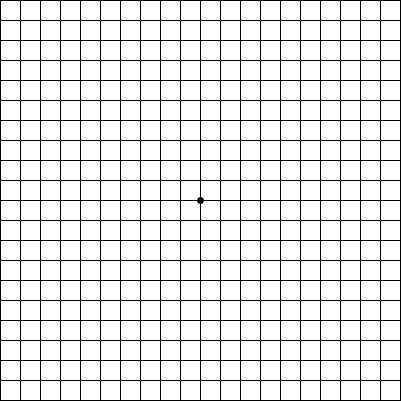Macular Degeneration Evaluation and Treatment

What is Macular Degeneration?
Macular degeneration is the leading cause of vision reduction in people over the age of 55. It is an incurable disease caused by the deterioration of the macula, an area located in the retina at the center back of the eye. The macula allows you to see fine detail when reading, driving or performing other everyday tasks. If photoreceptor cells in the macula deteriorate, they stop sending impulses to the optic nerve and vision decreases.
Types of Macular Degeneration
There are two types of Macular Degeneration: dry and wet. The dry form is more common, affecting about 90% of all cases. In this form of the disease, vision loss occurs very slowly over time. Individuals who have dry macular degeneration do not usually lose all of their central vision. The losses that do occur may make activities that require fine detail, like reading or sewing, difficult to perform. At this time, there are no proven treatments for dry macular degeneration.
The wet form of macular degeneration affects about 10% of all cases. This form of the disease progresses quickly and can cause serious, permanent loss of central vision. It is important to consult your eye doctor if you experience any of the symptoms below.

Symptoms
Macular Degeneration may have no symptoms at first, and if the disease progresses slowly, as in the dry form, it may cause no significant change in lifestyle.
- Difficulty reading without extra light or magnification
- Blurred vision
- Distortion in the shape, size or color of objects
- Loss of central vision with advancement
Prevention and Early Detection
Regular dilated eye exams and testing are the best ways to detect macular degeneration in its early stages before serious vision loss occurs. Stopping smoking and maintaining a healthy weight and diet, along with wearing UV protection and taking antioxidants, may further reduce your risk. Speak to your doctor to see how preventive measures can be a part of your overall health plan.
Testing and the Amsler Grid
Ocular Coherence Topography (OCT), Fluorescein Angiography and Fundus Photography are diagnostic tests used to detect and monitor macular degeneration. These tests can be performed in our office, eliminating the need to drive to a separate facility. Your doctor may ask you to use an Amsler Grid to help monitor your vision at home. The Amsler Grid is not a substitute for an expert medical diagnosis. Combined with diagnostic testing and medical supervision, it can give your doctor valuable information about your eyesight.
Your doctor will want to know:
- Can you see the corners and sides of the square?
- Do you see any wavy lines?
- Are there any holes or missing areas?
- Talk to your doctor promptly if you notice changes in your vision like those described above.

Treatment Options
Early detection is the only way to increase the chances of slowing the progression of this disease. Your doctor can tell you what options are right for your situation. Treatment options for the dry form can include:
- Nutritional supplements that contain antioxidants, vitamins A, C, E and zinc (AREDS2 formula vitamins)
- Ultraviolet coatings on eyeglasses
- Stopping smoking
The newest treatment for wet macular degeneration is regular injections with Eylea (aflibercept), Lucentis (ranibizumab), or Avastin (bevacizumab). The New England Journal of Medicine reported on a two-year medical study on the effectiveness of this treatment.
The findings are as follows:
- Intravitreal injections stabilized vision in 94.5% of the patients who received it.
- Visual acuity improved an average of 8.5 letters for 24.8% of the patients one year into the study.
Learn the Risks of Intravitreal Injections
Serious side effects related to the injection are rare, and complications can occur. They include increased eye pressure, inflammation inside the eye, and infection in the eye, detached retina, and cataract.


